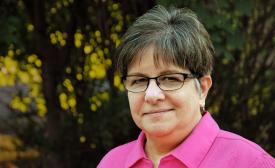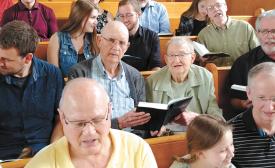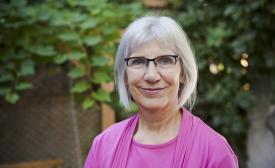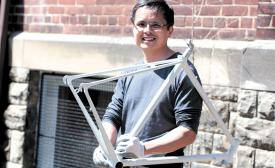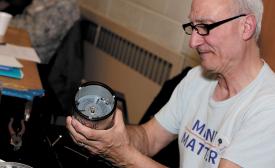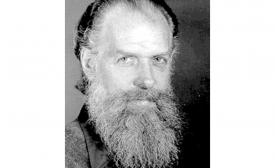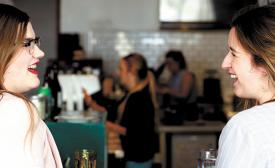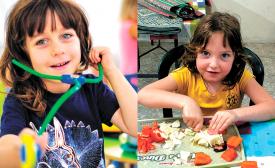Volume 22, Number 13
Green bench wisdom
The concept is simple. In a public place, an older adult sits on a green bench that is marked with the hashtag #ElderWisdom. Community members are invited to sit and engage in conversation about the senior’s life, experience and insights. Afterwards, community members can share about their experience on social media, using the hashtag.
‘God just isn’t finished with me yet’
I was raised in a family with Scottish Presbyterian roots, where no one talked about faith for fear of being “too religious.” We trusted that seniors had it all figured out and their faith carried them, although we would be stretched to say we understood how.
Readers write: June 18, 2018 issue
CommonWord connections
Here are five ways to remain connected with CommonWord in our new regional church model:
1. Keep reading
Many of us love a leisurely read on a summer beach blanket or in a hammock. Our 10th annual summer reading list might help you locate that perfect warm weather read.
Is flirting necessarily a bad thing?
What is flirting anyway? When is it a problem? When is it a delightful social interaction? I’ve been pondering these questions for years since a friend surprised me with the words, “You are such a flirt.”
A plan worth making
Like more than 51 percent of all Canadian adults, Roger (a pseudonym) did not have a will. As a child, he had been adopted into a wealthy family and, although he loved them deeply, he struggled to form a strong relationship with his siblings. They never became close.
Epp Garage
The Epp Garage in Fiske, Sask., suffered a devastating fire. When material, like this photograph, comes to the archives with little or no information, we can often learn about it from its context—the other “stuff” that comes with it. But in this case there was no contextual information. We don’t know the family, owner, photographer or date, to help us fully identify this photo.
Activate your core
It seems the majority of political, social and religious discourse today consists of knee-jerk reactions to the perceived agendas, biases, foolishness and dangerous “isms” of the “other.” This rampant reactivity makes constructive dialogue impossible. To make things worse, we all assume the log is in everybody else’s eye and the tiny speck is in our own. I’m no exception.
Still the same inside
For Anita Lehmann, home is the dementia unit at the Mennonite Nursing Home. But unlike most of the unit’s 29 other residents, Lehmann doesn’t suffer from dementia.
When it became evident she needed care, Lehmann took the only room available in the 68-bed facility, which happened to be in what staff refer to as the secure wing.
A soon-to-be favourite recipe
We all have our favourite recipes. There is the tried and true. Or there’s the newly created ones that are fun to test and then turn into classics.
A supportive space
The mission of Mennonite World Conference (MWC) is to create space for the global Anabaptist family to meet together. Much of the time, it is fulfilled virtually, on social media or through email connections across continents.
#ChurchToo conference tackles painful subject

A broken cup symbolizing a life shattered by professional sexual misconduct surrounds a whole cup, symbolizing survival from traumatic experience. #ChurchToo resource person David Martin, who has dealt with several cases of clergy sexual abuse as executive minister of MC Eastern Canada, said he has been ‘deeply pained but still profoundly hopeful’ in the process. (Photo by Amy Dueckman)
Many troubling issues and questions arise when a Christian leader engages in professional sexual misconduct.
A Bible comes home

Visitors examine the historic Bender Bible, which was returned to Canada 90 years after it left Ontario. Conrad Grebel University College held a ‘homecoming’ event on May 12, 2018, which included the story of how the Bible originally arrived in Upper Canada in 1832. (Photo by D. Michael Hostetler)
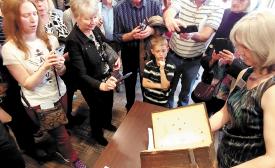
Descendants of Jacob and Magdalena Bender examine the historic Bender Bible, held by Laureen Harder-Gissing, archivist of the Mennonite Archives of Ontario. (Photo by D. Michael Hostetler)

A unique feature of the 274-year-old Bender family Bible are the hand-written inscriptions with family names and birthdates. In 1831, the Bible travelled from southern Germany with Amish Mennonite immigrants Jacob and Magdalena Bender, arriving in Upper Canada in 1832. (Photo by D. Michael Hostetler)
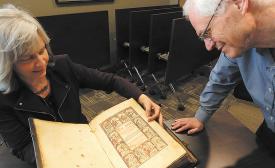
Archivist Laureen Harder-Gissing and historian Fred Lichti examine the the historical Bender Bible, which was recently returned to Canada. It was first brought to Upper Canada in 1832 by Amish Mennonite immigrants Jacob and Magdalena Bender but spent 90 years in an archive in the U.S. (Photo by D. Michael Hostetler)

Archivist Laureen Harder-Gissing points out details of the Bender Bible to Virginia Hostetler. The historic Bible was brought to Upper Canada in 1832 by Amish Mennonite immigrants Jacob and Magdalena Bender, Hostetler’s ancestors from six generations back. (Photo by D. Michael Hostetler)
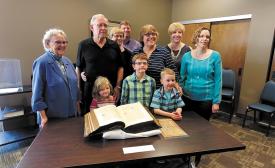
Descendants of Ivan and Beatrice Bender pose with the Bender Bible, a family heirloom, and the passport of their ancestor Jacob Bender, who brought the Bible to Canada in 1832, along with his wife Magdalena and their children. Pictured from left to right, back row: Grace Bender and Daniel Bender; middle row: Geoline Bender, Richard Bender, Mary Ann Bender, Laurel Bender-Lloyd and Sarah Clemmer; and front row: children Oliva Clemmer, Mason Clemmer and Benjamin Bender. (Photo by D. Michael Hostetler)

A historic Froschauer Bible, printed in 1744, found its way to the Mennonite Archives of Ontario, thanks to the efforts of archivist Laureen Harder-Gissing and local historians Fred Lichti and Catherine Schlegel (not pictured). It is informally known as the Bender Bible because it was brought to Upper Canada by Amish Mennonite immigrants Jacob and Magdalena Bender, in 1832. (Photo by D. Michael Hostetler)
On May 12, some 125 people gathered at Conrad Grebel University College for an unusual homecoming celebration—for a Bible. This large, centuries-old book is a part of Ontario Amish Mennonite history.
Faith and fixing at the Repair Café

Dan and Erin paint the Repair Café trailer outside the Toronto Chinese Mennonite Church. (Photo by Frank McKinney)
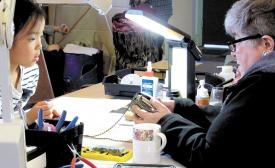
Five-year-old Summer watches volunteer fixer Bennett McCardle fix the broken clasp on her purse that her grandma gave her. (Photo by Julie Trinh)
Four years ago, my father Albert Kiang passed away. He was the ultimate Mr. Fix It, whether it was cars, computers or electronics. He was always tinkering away.
Good neighbours, good food
Volunteers Sheila Harder, left, Eileen Flath and Hariette Melin sort through donated produce at the Good Neighbours Food Centre. Whatever isn’t good enough to go into a food hamper will be placed in the food bank’s vermicomposting tower. Nothing is wasted. (Photo by Donna Schulz)
Lawrence Schmidt bags loaves of bread at the Good Neighbours Food Centre in Rosthern. (Photo by Donna Schulz)
Wilmer Froese hopes the Good Neighbours Food Centre will become a place where the marginalized are incorporated into the community. (Photo by Donna Schulz)
Volunteers Elaine Janzen, left, and Sheila Harder arrange groceries in preparation for assembling food hampers at the Good Neighbours Food Centre. (Photo by Donna Schulz)

Larry Epp talks with Grade 3 students at Rosthern Elementary School as part of Planting, Picking and Preserving for Students and Seniors (P3/S2), a program of the Good Neighbours Food Centre in which experienced gardeners partner-teach students about growing food. (Rosthern and District Food Bank photo)
“In my walk with the food bank,” says Wilmer Froese, “I feel like I am putting my faith into action, and doing so in a more deliberate way than I ever have before.”
He and his wife Barb spent many years co-pastoring a number of Mennonite Church Saskatchewan congregations. Now retired from both farming and pastoral work, they have found a new calling—feeding the hungry.
Influential writer also a flawed earthen vessel
For his funeral text, Urie Bender chose the passage from II Corinthians 4:7: “We have this treasure in earthen vessels” (KJV).
Picture perfect
Jay Siemens was set to begin photography school in Winnipeg when, three days before classes started, his friend called him with a compelling proposition.
“He said, ‘You’ve got to drop out of school and film a fishing show with me,’ ” Siemens recalls.
So he did.
Taking charge
Two young women from Mennonite Church Canada congregations are the creators of a new podcast about entrepreneurship.
True connections
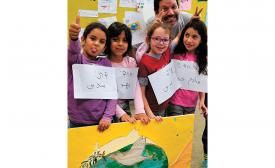
A Grade 3 class at Hagar Association made signs for International Tolerance Day to promote ethnic and religious tolerance in the region. Hagar is a bilingual MCC-supported school educating 330 Arab and Jewish children from age 1 to Grade 6 in Be’er Sheba, Israel. (Photo courtesy of the Hagar Association)
Walk into Hagar Association, a school in Be’er-Sheva, Israel, and it looks like almost any other school. But if you listen closely, you’ll hear children speaking both Hebrew and Arabic, and see them playing together—uncommon sounds and sights in the region.

